This highly adaptable and underused native should be a workhorse in most every sun-loving garden. Thanks to the introduction of recent cultivars, the ninebark now sports numerous foliage colors, grows large into a dramatic backdrop or more compact for front-of-the-border use, shows off in early summer with small clusters of white to dark pink flowers that are followed with papery clusters of seeds, and exposes its great structure in winter with its dramatic exfoliating bark that gives this shrub its name. Both wildlife and native plant lovers appreciate its understated but charismatic presence. What's not to love?
I am totally enamored by this plant. As a garden designer I've never quite understood why it is not more commonly used. I believe that you too will become captivated with the ninebark and dare to allow it to bring its depth of color, interest and texture to your garden. Let's get started.
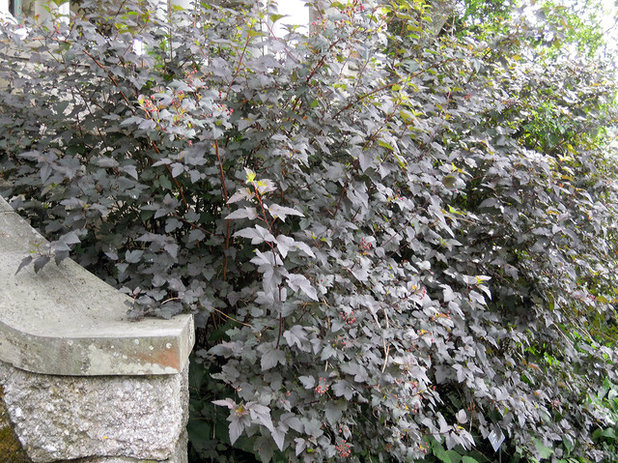 Botanical name: Physocarpus opulifoliusCommon name:
Botanical name: Physocarpus opulifoliusCommon name: Ninebark
Origin: Native to eastern North America
Where it will grow: Hardy to -45 degrees Fahrenheit (USDA zones 2 to 7; find your zone)
Water requirement: Moist to average
Light requirement: Full sun to partial shade
Mature size: Up to 8 to 10 feet tall and wide, depending on cultivar
Benefits and tolerances: Dramatic, showy foliage, exfoliating bark, delicate flower heads and colorful seeds. Extremely temperature tolerant; adaptable to a variety of soil types. This shrub appreciates consistent moisture so it is very useful in moist problem areas.
Seasonal interest: This plant shows four-season interest. It exhibits dramatically colored spring foliage; blooms in early summer with white to pink flowers, depending on the cultivar; seeds form in drooping clusters in early fall. During winter the papery exfoliating bark adds a new dimension to the garden.
When to plant: Fall and spring
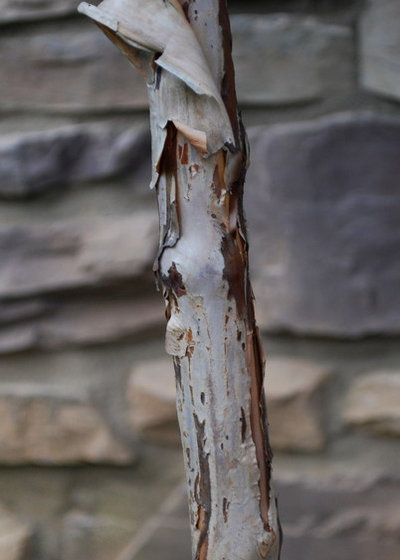
Jay Sifford Garden Design
Distinguishing traits. The ninebark earns its name by exhibiting a deeply exfoliating textured bark. This is most evident in winter after the shrub has shed its leaves and makes a unique statement in the winter garden.
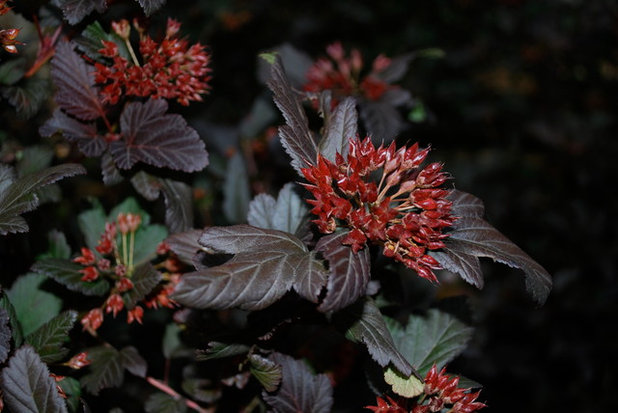
Jay Sifford Garden Design
In early summer the ninebark is garnished with delicate clusters of flowers that range from white to dark pink depending on the cultivar.
This shrub is quite attractive to wildlife. In early summer when the plant is in bloom, it attracts butterflies, bees and hummingbirds. After the seeds set, birds, especially finches, love the ninebark. Pruning the plant back somewhat in late winter or early spring may cause the ninebark to produce more food for wildlife.
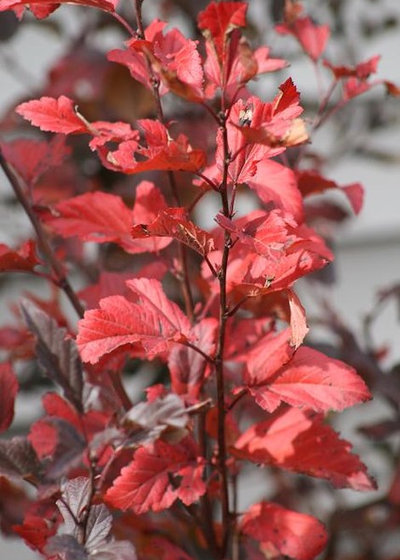
Benjamin Vogt / Monarch Gardens
Now onto the main reason this shrub belongs in your garden: the foliage. Newer cultivars, such as this
‘Coppertina,’ are stealing the show from the older
‘Diabolo‘ (syn. ‘Monlo’), which adorns itself with nearly black foliage. Ninebarks exhibit their best color in full sun.
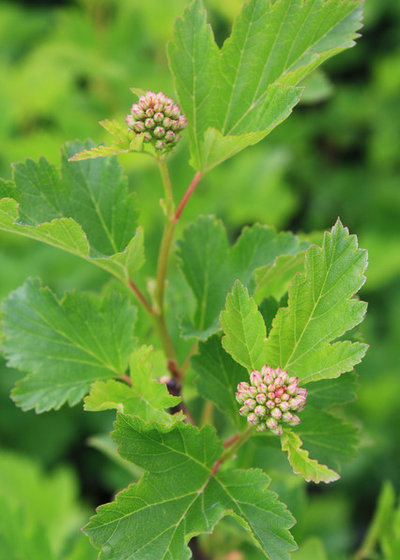
Not So Hollow Farm
There are now chartreuse cultivars, such as
'Dart's Gold' on the market.
'Amber Jubilee' combines the freshness of chartreuse foliage with dramatic metallic accents.
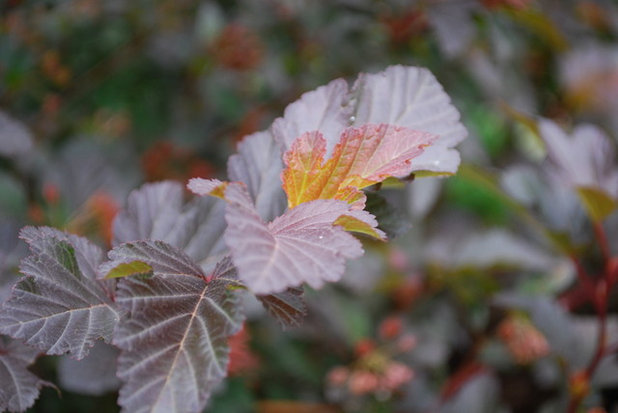
Jay Sifford Garden Design
'Center Glow' is a newer cultivar that exhibits an array of metallic colors in its foliage. The foliage normally darkens over the course of the growing season.
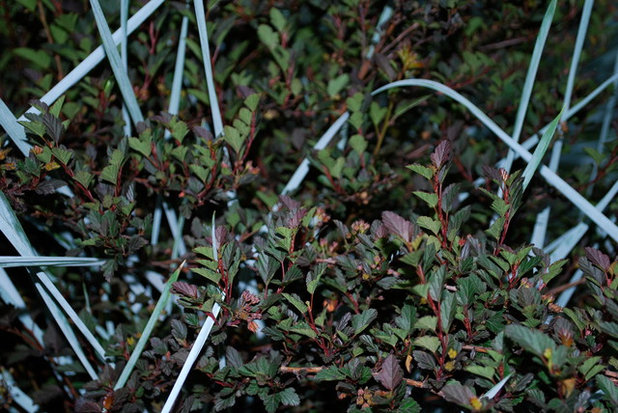
Jay Sifford Garden Design
A smaller ninebark is finally available to those with limited space.
'Little Devil' grows to 3 to 4 feet tall and wide and earns its place where its larger siblings would overwhelm.
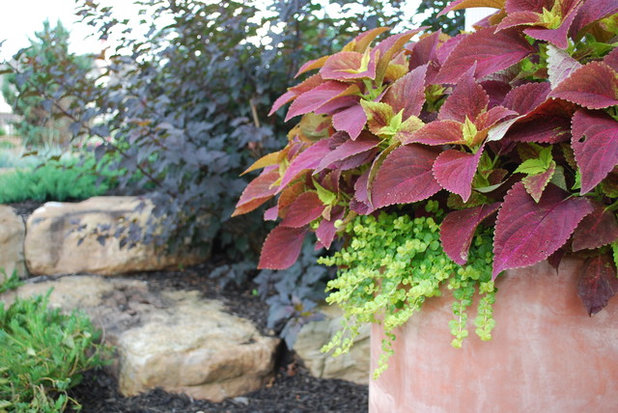
Jay Sifford Garden Design
How to use it. Some of the larger ninebarks, such as this ‘Diabolo,’ make dramatic backdrops for an array of summer-blooming annuals. Here, ‘Diabolo’ (in the background) shares the spotlight with a pot of ‘Alabama Sunset’ coleus (zones 10 to 11) and creeping Jenny (
Lysimachia nummularia, zones 4 to 8). The use of brightly colored foliage in front of ‘Diabolo’ makes for a season-long show that is not to be missed.
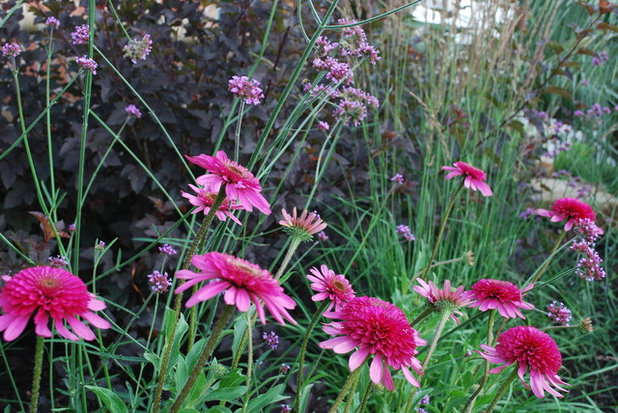
Jay Sifford Garden Design
In similar fashion, ‘Diabolo’ makes a great backdrop when highlighting flowering perennials. One of my favorite summer star combinations is pink coneflower (
Echinacea purpurea cvs., zones 3 to 8), tall verbena (
Verbena bonariensis, zones 7 to 10), and Karl Foerster feather reed grass (
Calamagrostis x
acutiflora ‘Karl Foerster’, zones 4 to 9), backed up by a chorus of ‘Diabolo’ ninebarks.
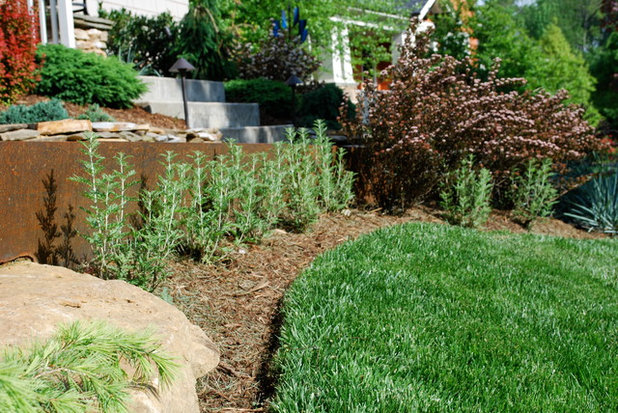
Jay Sifford Garden Design
Here we see the foliage of 'Little Devil' reinforcing the color of a rusted steel wall. This allows the blue spires of Russian sage (
Perovskia atriplicifolia, zones 4 to 9) and the luxuriant blue foliage of certain ornamental grasses to show themselves to best advantage.
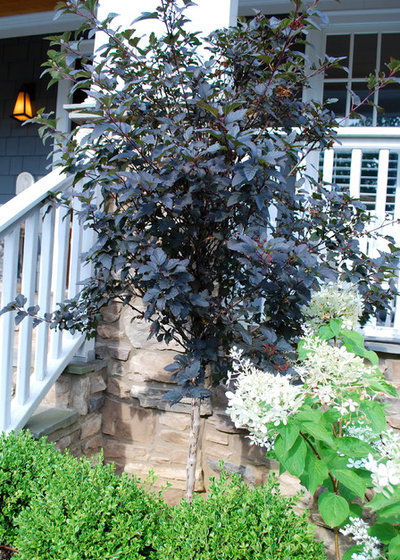
Jay Sifford Garden Design
Planting notes. Choosing the proper cultivar and form for your garden space is of primary importance. Most ninebarks, with the exception of ‘Little Devil,’ can become quite large, which promotes their use as hedge and back-of-the-border plants. If necessary, they may be pruned severely in late winter or early spring before new growth begins.
Several cultivars are now being grown into patio trees, such as this ‘Diabolo’. This standard form makes a great addition for smaller courtyard gardens or as focal points in mixed beds.
For best foliage color, plant ninebarks in full sun. They are quite adaptable to a variety of soil conditions. My experience has been that they need to be watered quite frequently for several weeks after planting. After they become established, however, they are basically care-free. This bit of extra care on the front end will allow the ninebark to reward you richly for years to come.





